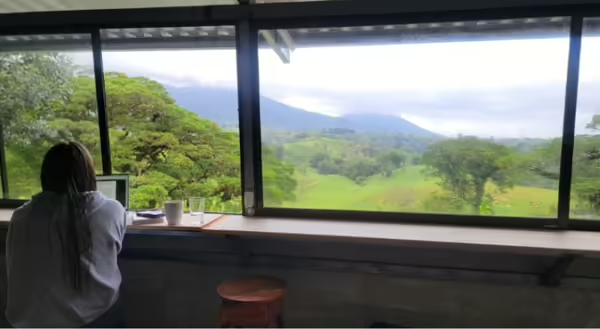
Around the world we see countries tapping into renewable energy as sustainability and innovation are becoming higher priorities. Investing in research on how we can better care for our earth and utilize renewable energy can reshape our lives for a cleaner and brighter future. However, the rate of adoption for practices can be a challenge as scientists and policymakers weigh the pros and cons to help decide what actions we should take.
Costa Rica is one country that has embraced renewable energy and resource conservation efforts as a nation. In 2018, about 98.53% of Costa Rica’s energy was supplied by renewable energy. Almost 80% of the energy production comes from hydropower with wind and geothermal energy also being utilized. Costa Rica's geographical advantages, such as its numerous rivers, dams, and volcanoes, provide ideal conditions for the development of hydropower. The nation takes great pride in its successful embrace of sustainable practices, both on a large scale and at a community level.
Tomas Enrique Dozier, the National Director for the Association for Development through Education in Costa Rica, continues to educate about resource conservation and best practices for individuals in their daily lives. Dozier and his partners engage with farmers, schools, government officials, businesses, and community members throughout Costa Rica. Their efforts focus on educating more individuals about the importance of living an environmentally conscious life and helping to train them in what that looks like in practice.
Dozier notes the importance of being aware of water conservation throughout the water cycle, due to the significant role hydropower plays in Costa Rica. Collecting stormwater has become a more normalized practice in the U.S. with the use of rain barrels, but water management can be taken further by using greywater and blackwater.
Greywater refers to wastewater used for any washing, laundry, bathing, or showering. This water can be reused for nearly any non-contact use such as irrigation or toilet flushing.
Blackwater is any waste from toilets, which Dozier captures and processes for biomethane energy, providing energy back to his home.
Water conservation in Dozier's household includes utilizing a pan of water for washing dishes rather than leaving the water running or filling up one side of the sink and being mindful of time spent in the shower.
Other forms of resource conservation Dozier engages in include growing vegetables to reduce consumption from outside sources, composting waste scraps for the garden to improve soil health, preserving the natural forest on their land to produce oxygen and maintain the aquifer levels, and collecting manure from farm animals to assist the biomethane digester.
While Costa Rica’s culture, geography, and energy policies differ from the prairies or suburbs found in Illinois, it is encouraging to see such effort go into caring for our natural resources. It is also inspiring to know individuals who are striving to make a difference through educating others. Another side of Dozier’s work with ADE involves teaching the course Sustainable Tropical Agriculture and Development. This course allows students from the U.S. to travel to Costa Rica to learn about community and economic development through hands-on experience.
Dozier shares that the key to helping others better understand sustainability is to recognize development is about empowering people and building capacity so we can continue to multiply the efforts. Students in this course learn about the possibilities of utilizing renewable energy, composting at home, being water conscious, and making small daily steps toward being more sustainable. These practices can look different for everyone, but by learning from hydroponic lettuce farmers and cacao plantations, we can better understand how to protect natural resources and steward our lands.
Related links:
SOURCES:
Photo sourced from Au Sable Institute